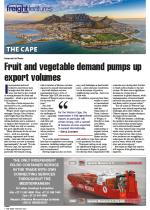Ports in the Western and Eastern Cape are maintaining operations despite the impact of Covid-19-related challenges. This is according to Mike Walwyn, consultant for the South African Association of Freight Forwarders (Saaff ), and Terry Gale, chairman of the Exporters’ Club Western Cape (ECWC). According to Gale, operations at the Port of Cape Town are working smoothly, with the main delays being related to weather (wind) and ageing equipment which have resulted in vessels bypassing these ports. “These two factors affect the landside operations as the knock-on effect is that trucks cannot access the terminals and the delays are four to five hours at a time. There is a truck staging area in the pipeline that will alleviate the inconvenience of waiting, as the truckers stand in the open, having no facilities at all,” said Gale. “The good news is that the Transnet Freight Rail Belcon Terminal has now come into operation as an ‘inland terminal’ to assist with the acceptance of containers when the port is windbound, which means containers can be gated in at Belcon, reefers included, then railed to the port when stacks open. There are 70 plug points available. Transnet has assured industry that the cold chain will not be broken. This facility is particularly relevant and beneficial to the fruit farmers in the hinterland. There is a daily train shuttle from Belcon to the port that can be increased once volumes increase,” he said. Weighing in on the matter, Walwyn said that the Port of Saldanha, which is a bulk port, had fewer challenges than the other ports in the region. “Port Elizabeth does not handle big volumes of containers these days, with most of them going to Ngqura, so the impact at PE is relatively small. Ngqura itself is also hampered by low productivity because of equipment breakdowns, though possibly not to the extent that Cape Town is,” said Walwyn. Commenting on how social distancing was affecting the ports, Walwyn said: “The ports report regularly at weekly teams meetings, and the impression is that the pandemic’s impact is being managed quite well. Fortunately, in recent weeks, very few operational staff have been affected – the infections seem to be more related to administrative personnel. In the nature of port operations, individual workers don’t work that close to each other, so social distancing is to some extent automatic, and we notice that mask wearing seems to be rigorously enforced. The fact that most work is conducted in an outdoor environment probably also helps.”Both Gale and Walwyn acknowledged that due to the economic downturn, import volumes were lower than normal.Fortunately, in recent weeks, very few operational staff have been affected - the infections seem to be more related to administrative personnel.– Mike Walwyn“

